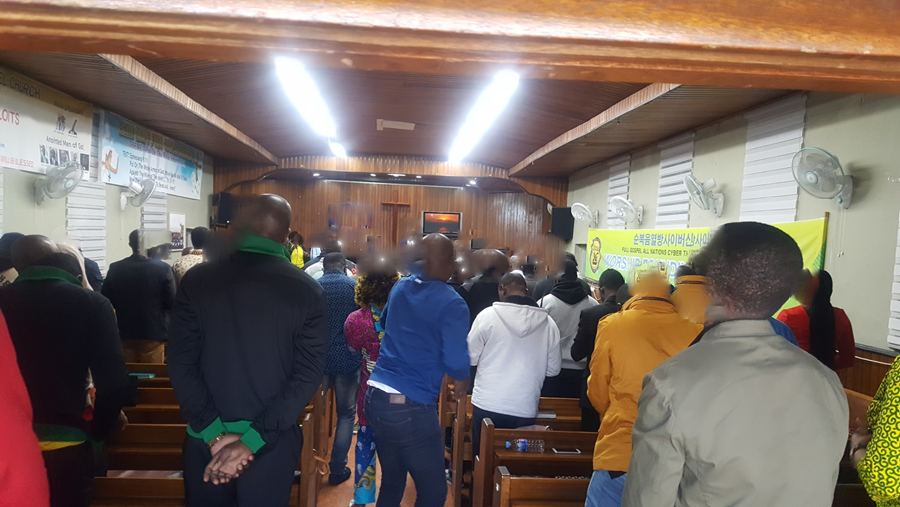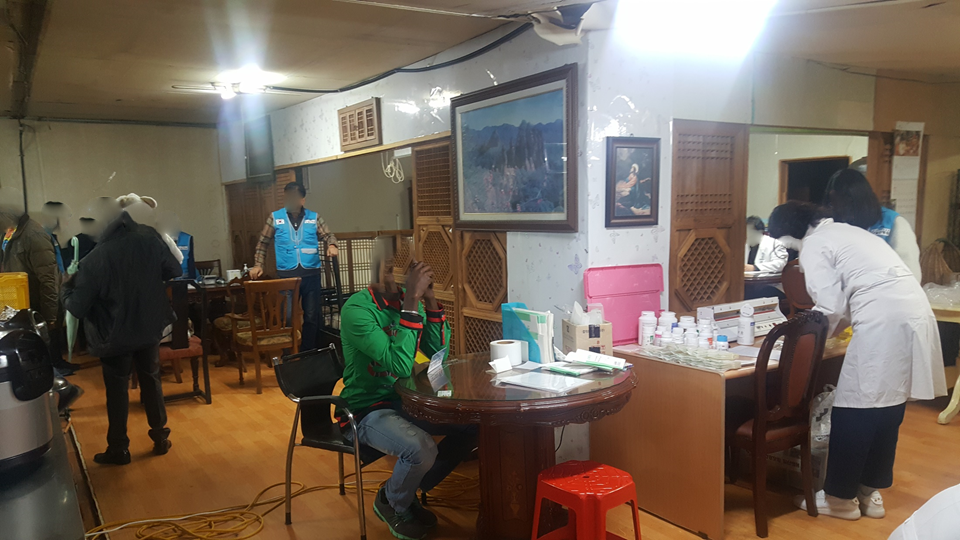The Bottom of the Ladder – African Migrants in South Korea
Dr. Rita Udor
One Saturday evening six months after I went to Willow village for my field studies, I was introduced to Ziggy by my informant. Sunday after church, in the hot summer afternoon, I met with him. He was wearing a winter jacket, and I wondered how anyone could wear such thick clothing on such a hot day. As we walked down to a burger restaurant, I asked him if he wasn’t uncomfortable – I was sweating myself, in just my cotton shirt. He brushed my question aside and asked if I were new to the area. After we went inside and placed our order, I engaged Ziggy in casual conversation. Before I could formally begin my interview, he explained that he’d lost his finger while working construction and was wearing the jacket to hide his hand. He described how his boss had refused to send him to the hospital. Because Ziggy was undocumented and not legally allowed to work in Korea, he was afraid to claim insurance benefits.
Like Ziggy, many Africans come to Korea healthy but return ill or injured – what some scholars call the “salmon bias” (Ullmann, Goldman, & Massey, 2011). Injuries or even deaths among African labor migrants were so common that during my field study, almost every person I interviewed had some meaningful injury, and four later died in work-related accidents. These injuries had an additional gender dimension, as none of the women I interviewed experienced this (except back pain, common among all participants).

Africans in South Korea at their own African church.
These workers’ injuries were worsened by their lack of legal immigration status and the racism against Africans. South Korea does operate a labor migration system called the Employment Permit Scheme, but only for laborers from 16 Asian countries (Ministry of Employment and Labor, 2017), and this process has been heavily criticized for its failure to protect the human rights of workers (Chung 2020). African workers lack even these modest protections, and Koreans’ preference for light skin – considered more desirable and associated with higher social status (Kim 2020) – puts Africans on the lowest rung of the social ladder. This combination of factors places African migrants in a precarious position, and vulnerable to exploitation. This is reflected in the lower wages they receive compared with their Asian counterparts, longer work hours, and assignment to 3D (dirty, dangerous, and difficult) jobs that Asian migrant workers refuse to perform.
Despite these challenges, an increasing number of Africans are choosing South Korea. According to Korean Statistical Information Service (KOSIS), 20,671 Africans resided in Korea in 2019, 72.6% men (KOSIS, 2020). Most enter Korea on student, business, or tourist visas but end up working illegally in the informal sector – even those who graduated from Korean universities. Their work in 3D jobs exposes them to injuries and sometimes death. When I interviewed Ziggy, he said, “I thank God because I only lost one finger, some even lost all their fingers and I heard some people died.” In 2020, Thomson Reuters Foundation found that at least 522 Thais had died since 2015, 84% of whom were undocumented (Reuters, December 22, 2020). While these data are alarming, they say little about how injuries and deaths are exacerbated by race and other intersecting social locations like skin color and country of origin. The lack of attention to these intersectional factors underscores the marginalization that African labor migrants face in Korea.

Africans receive healthcare services from Korean volunteers at their church, as most are unable to visit hospitals due to their legal status.
Marginalization of Africans is certainly also well documented in Western countries, where they share historical ties and a history of slavery. The current influx of Africans to Asian countries where they have few historical ties raises the question of why Africans face marginalization globally even where they represent only a recent addition. What is the position of African countries in global society, and can that position ever change? While we ponder these questions, there is an urgent need for countries like South Korea to accept the realities that come with globalization and treat all migrant workers with human rights.
References
Chung, Erin Aeran. 2020. “Creating Hierarchies of Noncitizens: Race, Gender, and Visa Categories in South Korea.” Journal of Ethnic and Migration Studies 46(12):2497–2514.
Kim, Hyein Amber. 2020. “Understanding ‘Koreanness’: Racial Stratification and Colorism in Korea and Implications for Korean Multicultural Education.” International Journal of Multicultural Education 22(1):76-97.
KOSIS. 2020. “Status of Foreigners Staying by Nationality, Region and Age.” Korean Statistical Information Service. Retrieved August 28, 2021. (http://kosis.kr/statHtml/statHtml.do?orgId=111&tblId=DT_1B040A6).
Ministry of Employment and Labor.2017. “Employment and Labor Minister has meeting with ambassadors of 16 sending countries under EPS”. Retrieved August 28, 2021 https://www.moel.go.kr/english/poli/poliNewsnews_view.jsp?idx=1363
Reuters, 2020. “Hundreds of Thai workers found dying in South Korea with numbers rising”. Retrieved August 28, 2021 https://www.reuters.com/article/us-thailand-southkorea-workers/exclusive-hundreds-of-thai-workers-found-dying-in-south-korea-with-numbers-rising-idUSKBN28W033
Ullmann HS, Goldman N, Massey DS.2011 “Healthier before they migrate, less healthy when they return? The health of returned migrants in Mexico”. Soc Sci Med. 73:421–428.
Author biography
Rita Udor is a lecturer at Simon Diedong Dombo University of Business and Integrated Development Studies in Ghana. Her research borders on issues of intersection of gender, race and development. Her recent article ‘The effects of colourism on migrant adaptation in Asia: the racial exclusion of African migrants in South Korea’s “multicultural” society’ can be accessed here. She can be reached at rudor2@gmail.com.




Thanks for this research,it has helped shade light to me a s an African from Uganda